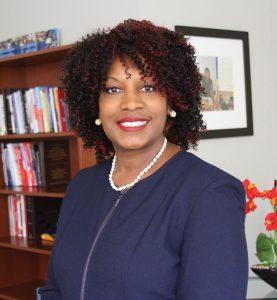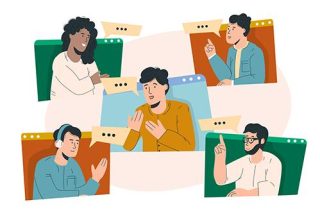FOCUS
The school board’s role in a professional learning system
By Jefna M. Cohen
Categories: Advocacy/policy, Collaboration, OutcomesAugust 2023

School boards are an important but often unacknowledged part of professional learning systems, although they allocate two essential resources: funding and time. To learn more about this role and how learning professionals can collaborate with school boards, we spoke with Verjeana McCotter-Jacobs, who was recently named the new executive director and CEO of the National School Boards Association after having worked for the organization since 2017 and serving on the Prince George’s County school board in Maryland for 10 years. This interview has been condensed for clarity and length.
Q: What roles do school board members play in enabling and supporting professional learning for teachers and leaders?
A: School boards play a critical role in budgeting and developing the school schedule. When we think about scheduling, there are two components. There’s the bell schedule, in which they aren’t as involved, and the school calendar, which they develop in collaboration with their superintendents. Of course, they set aside days for professional learning in yearly calendars. But boards handle professional learning in different ways. It’s how many days in the calendar are allocated for professional learning without students in the building, but it’s also about creating peer opportunities.
At the National School Boards Association, teacher retention is part of our advocacy agenda. We are pushing to have teachers get paid more and have more support to deal with our teacher shortage issue that everybody is experiencing.
Q: Why is it important for school board members to understand professional learning and its value?
A: When school board members are running for office, professional learning is probably not their top issue, but, after taking office, they very quickly learn its importance. Professional learning is about raising the bar for teachers to be better at their craft. I’m talking about aligning teacher professionalism and teachers’ skill sets to what they’re delivering to kids.
''Professional learning is about raising the bar for teachers to be better at their craft.'' - Verjeana McCotter-Jacobs, Executive Director & CEO @NSBAPublicEd #educator #edutwitter #TheLearningPro Click To TweetYou have to answer the question: What will be the outcomes, ultimately, for students as a result of professional learning? People don’t necessarily see that connection. As a parent, you may think it’s another professional day or another day that the teachers have off. That’s why it is important to help parents and others make the connection that professional learning is directly tied to student outcomes. That’s a key message that sometimes gets lost, and I think that’s really important. School boards can help the community understand that.
''Professional learning is directly tied to student outcomes. School boards can help the community understand that.'' - Verjeana McCotter-Jacobs, Executive Director & CEO @NSBAPublicEd #k12education #EdLeadership #ProfDev Click To TweetQ: How would you recommend that educators advocate for professional learning time and funding to their school boards?
A: This depends on the community because we (National School Boards Association) are all about what’s best in local communities. One way to advocate is to come to school board meetings and testify. Provide what you know about the importance of professional learning, say, “These are the outcomes from our professional learning,” and show how it’s enhancing teachers’ skill sets and leveling up professionalism in their craft. Definitely be engaged and involved and advocate for budget time and the scheduling process, but not just at those times. Use the parents to your advantage and have them be part of the conversation because they do influence, and highly influence, what happens at school board meetings.
Q: Can you give any examples where leaders worked with the school board to increase professional learning capacity?
A: In one example, the school board worked with the superintendent and the cabinet on the question of what professional development looks like for their district. This was so important because school boards have started to have conversations about how we require teachers to do professional development and don’t do it themselves. Boards are realizing they need professional development, too, so they can be better at governance and board policy, etc.
In this case, the superintendent wanted the board to agree to a long-term (two-year) professional development process, and the board was already giving so much of its time. The discussion evolved to how we want our educators to be up-to-date and prepared and so the school board should, too, to ensure its members have the knowledge necessary to make the right policy decisions. The school board worked on developing policy, community relations, and a better understanding of what it means to allocate resources based on the needs of the local district.
I think if we look at communities and school boards that are working in tandem with the administration and community, there are opportunities to do things together.
Q: We know that professional learning is sometimes perceived as a burden. How can we share the message that it matters, that the end goal is to benefit students?
A: You have to say what you’re going to do, do what you said you were going to do, and then tell people you did it. Use storytelling to get that message out. I think that’s always important.
Build the relationship with parents because parents will just see it as a day off if there’s no communication before or after that says, hey, this is what’s happening. Get that parent or group of parents to help tell the story, come to the school board meeting, talk about it, and share with the community to the extent you can. Where there are teachers unions, they should be helping to communicate that, too.
Also, connect with businesses. Every community pretty much has a chamber of commerce, and they have a great interest in schools. Say to the businesses that we need support to help us advocate. Go to them to talk about the importance of teacher professional learning and the impact that it has in the community. In our community, we use the businesses to give teachers scholarships.
You can use every opportunity to push an agenda that’s supportive of students. You’ve got to leverage those pieces you already have.
At National School Boards Association, we intentionally integrate students and student voice into several of our sessions at our various events. Those sessions always receive the highest attendee ratings. Student success is why our school board members do the hard work they do. And learning opportunities are critical to renewing energy, learning new strategies, and expanding one’s professional network.
Q: What else would you like professional learning leaders to know about how school boards operate or how our community could help them?
A: School boards are groups of volunteers who have enormous responsibility, and they are either not paid or paid a small stipend. They are juggling the task of being a school board member and, at the same time, their day job, if they have one.
We are also community members. I often say our offices are in the grocery store, or Walmart, or wherever, because that’s where parents see us and talk to us. Take advantage of those opportunities when you see them. Come to the meetings. I remember sitting in school board meetings and someone would come with a public comment, and it just raised so many questions for me. It led to me asking the superintendent for more information. Educate your school board. That’s how it can start.
Also, understand that school board members have competing interests. That’s why, when you’re advocating for your interests, you’ve got to make that connection to outcomes for students and to the desired results from either the strategic plan or goals that the district has laid out.
Remember that school board members are coming into the role with different backgrounds and areas of knowledge. Some are prior educators and some are not. If you are willing to work with them, I’ve seen that they’re committed to creating that opportunity to collaborate.

Jefna M. Cohen is associate editor at Learning Forward.
Categories: Advocacy/policy, Collaboration, Outcomes
Recent Issues
EVALUATING PROFESSIONAL LEARNING
February 2024
How do you know your professional learning is working? This issue digs...
TAKING THE NEXT STEP
December 2023
Professional learning can open up new roles and challenges and help...
REACHING ALL LEARNERS
October 2023
Both special education and general education teachers need support to help...
THE TIME DILEMMA
August 2023
Prioritizing professional learning time is an investment in educators and...











